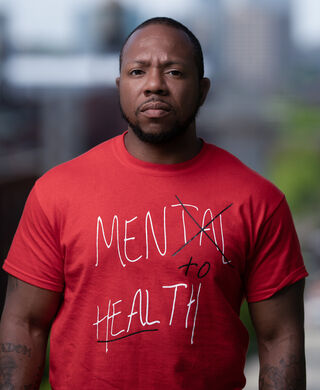

A guest post by James Harris, LPC-R of Men to Heal.
I challenge you to feel your feelings. Men often relate themselves to something majestic, like a beast. They protect their offspring, work for their families, and have a strong sense of pride in their kingdom. But what happens when the beast is experiencing something that he is unfamiliar with? Everyone feels sad, irritable, or tired at times. Many people experience difficulty sleeping when they’re under stress. These are normal reactions to life stressors that typically pass within a few days. For many beasts, the ego tends to blind the feeling of what actually is taking place.
The Beast During COVID-19
During this time of pandemic, many will look for the man to lead not only themselves but their homes, work, and probably communities, in efforts to get through this tough time. It is important that the beast paces himself and not become overwhelmed. He should remember to say “no” or “not right now” if he is unable to meet a demand as opposed to taking that demand a becoming depressed or bothered. You’re not less than if you react with emotions during COVID-19. Some of the things you are going to feel may include:
- Mixed emotions, including relief after quarantine.
- Fear and worry about your own health and the health of your loved ones.
- Stress from the experience of monitoring yourself or being monitored by others for signs and symptoms of COVID-19.
- Sadness, anger, or frustration because friends or loved ones have unfounded fears of contracting the disease from contact with you, even though you have been determined not to be contagious.
- Guilt about not being able to perform normal work or parenting duties during quarantine.
- Other emotional or mental health changes.
There seems to be a misconception about men and depression. From afar or from the ego, this is viewed as a female diagnosis. I can’t tell you how many times I have heard, “I am a football player 6-foot, 6-inches and 286lbs, no way I can be depressed.” Truth is, depression has no discrimination. On the flip side, there is a very different display of signs and symptoms. According to the National Alliance of Mental Illness (NAMI), men who are depressed may appear to be angry or aggressive instead of sad, their families, friends, and even their doctors may not always recognize the anger or aggressive behavior as depression symptoms. Furthermore, men are less likely than women to recognize, talk about, and seek treatment for depression. Yet it is proven that depression affects a large number of men in today’s society than the past generations.
A large number of men with depression hide their emotions and seem angry, irritable, or aggressive while many women express sadness. Men with depression may feel very tired and lose interest in work, family, or hobbies. Many have difficulty sleeping and enjoying day to day activities. Mental health symptoms can appear in physical symptoms such as racing heart, tightening chest, ongoing headaches, or digestive issues. These all can be signs of mental health problems. Many men are more likely to see their doctor about physical symptoms than emotional symptoms.
Sadly, some men may turn to drugs, alcohol, and other reckless behaviors to try to cope with their emotional symptoms. Many studies report that women with depression are more likely to attempt suicide, men are more likely to die by suicide because they tend to use more lethal methods like knives or guns. When a beast is not in control, he seeks to be destructive.
Depression can affect men at any age. With the right treatment, most men with depression can get better and gain back their interest in work, family, and hobbies.
Some common symptoms of depression in a beast are:
- Anger, irritability, or aggressiveness
- Feeling anxious, restless, or “on the edge”
- Loss of interest in work, family, or once-pleasurable activities
- Problems with sexual desire and performance
- Feeling sad, "empty," flat, or hopeless
- Not being able to concentrate or remember details
- Feeling very tired, not being able to sleep, or sleeping too much
- Thoughts of suicide or suicide attempts
- Physical aches or pains, headaches, cramps, or digestive problems
- Inability to meet the responsibilities of work, caring for family, or other important activities
- Engaging in high-risk activities
- A need for alcohol or drugs
- Withdrawing from family and friends or becoming isolated
Causes of depression in the beast
Depression in men can be caused by a number of reasons. Studies have shown that depression is known to be one of the most common mental disorders in the U.S. currently. The direct cause varies based on individual, but in general, the research suggests that depression is caused by a combination of risk factors including:
- Genetic factors. men with a family history of depression may be more likely to develop it than those whose family members do not have the illness.
- Environmental stress, financial problems, loss of a loved one, a difficult relationship, major life changes, work problems, or any stressful situation may trigger depression in some men.
- Illness. depression can occur with other serious medical illnesses, such as diabetes, cancer, heart disease, or Parkinson’s disease. Depression can make these conditions worse and vice versa. Sometimes, medications taken for these illnesses may cause side effects that trigger or worsen depression.
Treating the beast
Men often avoid addressing their feelings and, in many cases, friends and family members are the first to recognize that their loved one is depressed. An important that friends and family support their loved one and encourage him to visit a doctor or mental health professional for an evaluation. A health professional can do an exam or lab tests to rule out other conditions that may have symptoms that are like those of depression. He or she also can tell if certain medications are affecting the depression.
The doctor needs to get a complete history of symptoms, such as when they started, how long they have lasted, how bad they are, whether they have occurred before, and if so, how they were treated. It is important that the man seeking help be open and honest about any efforts at “self-medication” with alcohol, non-prescribed drugs, gambling, or high-risk activities. A complete history should include information about a family history of depression or other mental disorders.
Conclusion
As a man, you will be no less of a beast if you have depression. If you meet the symptoms seek assistance. If not, the beast will display certain symptomology that will be detrimental to him, his work associates, and even family. Rage can come from this beast or this beast can channel that into reducing signs and symptoms of depression in a healthy way. I have written an interactive journal, Man Just Express Yourself. It has tools to assist men young and old with coping, identifying feelings among other things.
James Harris, LPC-R is a licensed mental health professional in Richmond, VA, who has worked with men and women for over 10 years. He provides community-based services as well as a private practice setting: The HEALing Hub, Avail Outpatient, and Inner Self. He has an international movement called Men to Heal.



